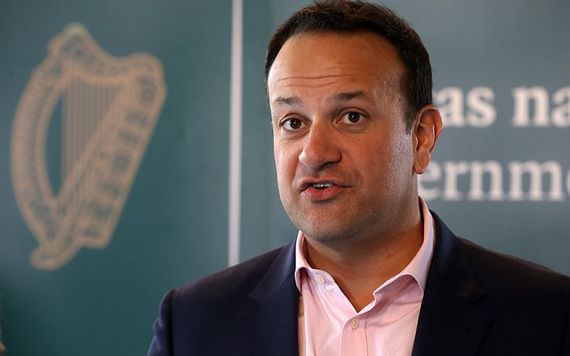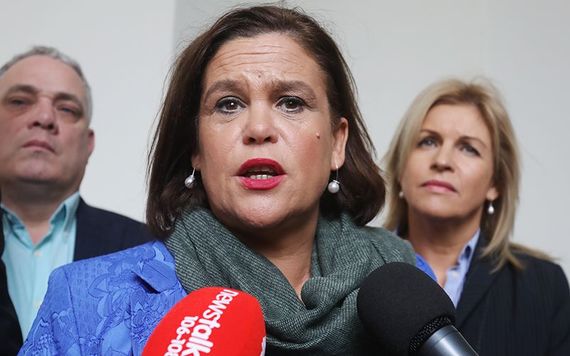A United Ireland may seem like the best option but Brexit is too complex for that.
"It's easy to get emotional about this and start singing “A Nation Once Again.” But it's not just a matter of answering the simple question of are you in favor of Irish unity?"
The Irish government is still vehemently insisting that Brexit can never lead to the return of a hard border in Ireland. The EU is behind us, Taoiseach Leo Varadkar says.
The backstop in the withdrawal agreement guaranteeing no border is rock solid. EU leaders have said repeatedly that will not be changed. We have their full support.
Read more Brexit coverage here.
To which all I can say is, good luck with that! I have been warning in this column for months that we should not take such guarantees as absolute.
As far back as April last year I predicted that if Brexit went badly and there was no deal "it would be the EU, not the U.K., which would want a hard border in Ireland ... concerned that a borderless Ireland might be used as a backdoor for cheap global products getting into the EU from the rest of the world via the U.K."
Read more: With over 30 days to go, winter is coming for Brexit Britain
Since then I have repeatedly warned that a border could not be ruled out, no matter what guarantees were given. In fact, I said some kind of border would be inevitable, not just if there was no deal but even if there was a partial deal that did not fully align the U.K. with the EU on tariffs and standards. Any variation from these terms and standards in the U.K. has to mean inspections and tariffs at a border in Ireland.
In that scenario—and certainly, if there is no deal—the simple fact is there would have to be a border of some kind in Ireland. With the U.K. out, the Irish border would become part of the external border around the EU which protects the customs union and the single market.
In spite of this reality, the Irish government has stuck doggedly to the line that there can never be a border here again, no matter what. But the more we push this line the more likely it is that Britain will crash out with no deal, and everybody knows that definitely means a hard border.
Unless the backstop is modified or time-limited, the withdrawal agreement which gives a much softer Brexit is never going to get through Westminster because it could lock the UK into the customs union indefinitely.
Read more: Irish refused to be “steamrolled” on Brexit backstop
No one wants a no-deal Brexit. For Ireland, it would be an economic disaster. Some other EU countries, including the heavy hitters Germany and France, would also pay a significant price at a time when the EU is drifting towards recession.
For us, we need to think carefully about whether we prefer to lose thousands of jobs rather than have a soft border of some kind. The leaders in other EU countries also have to decide whether they want to continue to back the Irish position and suffer the consequences in lost trade and lost jobs that a hard Brexit would bring.
The first cracks in EU solidarity with Ireland appeared in recent weeks, with statements about the inevitability of a border from a few EU officials and politicians. These statements were later partially walked back, but the message was clear.
In the past week, this softening up process moved up a gear. Reuters ran a story sourced at a senior level in the EU saying that a reassessment about the Irish border was underway. And last weekend, this reached a far higher level when details of a recent conversation between the German leader Angela Merkel and Varadkar were leaked.

Irish leader Leo Varadkar.
In this 40-minute phone call, Merkel is said to have told Varadkar that Ireland's inflexible stance on the backstop was preventing the EU from negotiating a U.K. withdrawal agreement that British Prime Minister Theresa May could get through Parliament. She is also reported to have told the Taoiseach that a hard border in Ireland will have to be considered if there is a no-deal Brexit. That might be stating the obvious but it is significant that the German chancellor was putting it so bluntly, even in private.
Read more: Support for united Ireland jumps as no-deal Brexit risk draws near
President Emmanuel Macron of France was at it as well. The Times in London reported last weekend that he had shifted position and now wanted a time limit on the backstop if it meant May's soft Brexit withdrawal agreement could be saved. The French have denied this, but The Times is standing by its sources.
Exactly how watertight the backstop guarantee is will become clear in the coming weeks as the countdown to Brexit ticks away. But all the signs are that the EU is shifting. They won't abandon us, but they are likely to insist that we face up to what they see as the reality of the situation.
If we want to stay in the EU after Brexit, we will have to compromise. Either that or exports from a borderless Ireland will face checks and controls at mainland EU ports to identify global goods that have originated in the U.K.
There is, of course, one way in which all this could be avoided (cue the music for “A Nation Once Again”).
Northern Ireland could join the rest of Ireland and stay inside the EU—a majority in the North voted to stay in the EU anyway. There would then be no border here (it would be in the Irish Sea instead). But it means the North leaving the U.K. and the reunification of Ireland.
Given the demographic shift in the North in recent years, that has now become a realistic proposition, although one fraught with all kinds of unfounded assumptions and very real dangers.
Recent surveys have shown that the Protestant/Catholic ratio in the North is shifting even faster than expected, and there could be a Catholic majority in the next couple of years and certainly within the next four years. (Catholics in the North are younger and have more children.)
This is driving the demand from some quarters (mainly Sinn Féin) for a border poll in the near future, something that is provided for under the Good Friday Agreement. But even if a poll is held, there is no guarantee that all Catholics in the North would vote for unity.
The attractions of the British welfare state, the health service and so on are strong, and there is a lot of uncertainty about how the annual £10 billion transfer from the U.K. to the North that funds all this would be replaced.
Having said that, there is also a significant number of moderate unionists in the business and farming sectors who would vote for unity if there is a hard Brexit and they are forced out of the EU with no parachute. An opinion poll in December found that 55 percent of people in the North would vote for unity if there was a hard Brexit (made up of 92 percent of nationalists and 10 percent of unionists). But that needs to be treated with caution because much would depend on what kind of future is being offered.
Another reality is that it's not just a matter of what people in the North think. It's often forgotten that under the Good Friday Agreement a border poll has to be held in the south at the same time. And although the majority of people in the south say they want unity there is a lot of concern here about the extra tax burden it would bring, about the threat of violence from unionist extremists, and so on.
Again, much would depend on what the question(s) in a border poll would be and on the detail that would be discussed in the run-up to the vote about the consequences and costs of unity.
It's easy to get emotional about this and start singing “A Nation Once Again.” But it's not just a matter of answering the simple question of are you in favor of Irish unity?
As people start drilling down into exactly what unity might mean for them—like how much extra tax they are willing to pay to make it possible—the outcome of a border poll will become much more unpredictable.
You will remember that the new Sinn Féin leader Mary Lou McDonald said last year that it would not be a good idea to have a poll now given the uncertainty of Brexit.

Sinn Fein leader Mary Lou McDonald.
She said it needs to be done in the best possible climate in a way that maximizes consent, and there needs to be sequencing that firstly delivers a level of economic and social certainty and stability. The question of Irish unity should be discussed on that basis, she added.
This thoughtful view made sense. But McDonald's repositioning of the Sinn Féin stance on unification (we want it immediately) lasted less than 24 hours before she was reined in by the Belfast hard men and forced to revert to the usual script.
Another misconception is that a quick border poll can be a solution to the Brexit problem. It would take two or three years to organize, and even framing the question(s) to be asked would be difficult, never mind the complexities of what kind of unified Ireland would be on offer. Would it be a federal structure, for example, with regional parliaments in Belfast and Dublin?
It took over two years to organize the Scottish independence referendum (which was lost) and that was a much simpler proposition. The bottom line is that a border poll cannot provide an immediate solution to the Brexit problem in Ireland.
For that, we need to look much closer to home and particularly to the catastrophe our inflexibility on the backstop may bring.
Do you agree? Let us know in the comments section, below.
Read more: No-deal Brexit would leave Irish trade most vulnerable in EU




Comments